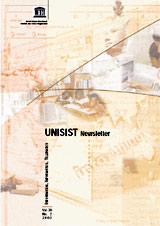It is with the objective of contributing to the improvement of communication training in Africa that UNESCO has developed the current model curricula which, as the name implies, can serve as benchmarks or standards for training and preparing communication practitioners on the continent.
Publication year: 2002
Following the COMNET IT/UNESCO Global Survey on On-line Governance published in 2000, the Commonwealth Network of Information Technology for Development (COMNET-IT), in association with and with the financial support of UNESCO, has developed national profiles detailing current status and developments in this area.
Publication year: 2002
Community Radio has a special place in UNESCO’s programs. The aim of UNESCO’s community radio program is to address crucial social issues at a community level, such as poverty and social exclusion, empower marginalized rural groups and catalyze democratic processes and development efforts.
Publication year: 2002
Publication year: 2002
This Report was commissioned by the UNESCO Office for the Pacific States in Apia, Samoa to provide an up-to-date picture of the development and use of Internet infrastructure in Pacific Member States of UNESCO.
Publication year: 2002
The present study of the UNESCO International Programme for the Development Communication (IPDC) – undertaken at the initiative of The Norwegian Ministry of Foreign Affairs – is basically a desk study of the Programme's organizational structure, its history and impact supplemented by an evaluation of selected projects based on IPDC reports and evaluations.
Publication year: 2002
Publication year: 2002
This edition takes the original General Guidelines to the Memory of the World Programme work as a departure point. It comprehends the accumulated experience of the last six years, including debate on the selection criteria and nomination process for the Memory of the World Register at the 1997 and 1999 meetings of the International Advisory Committee, and the Second International Conference of Memory of the World in 2000.
Publication year: 2002
Guiding principles for planners in education ministries and teacher-training colleges about when and how distance education can be used successfully to expand and upgrade the skills of the teaching force.
Publication year: 2002
This monograph is intended to help educational decision makers survey the technological landscape and its relevance to educational reform. It is firmly rooted in a vision of education that begins with the learner and attempts to understand how technological tools can better contribute to educational goals.
Publication year: 2002







